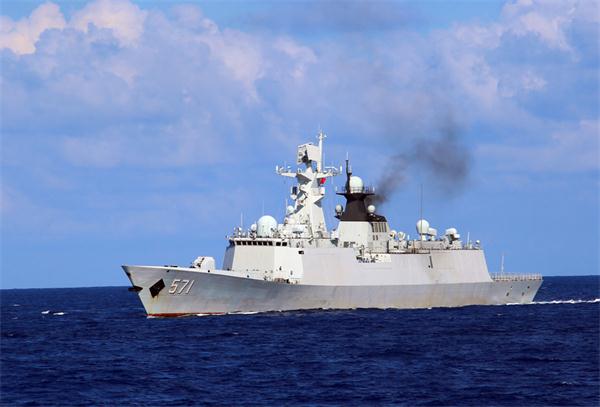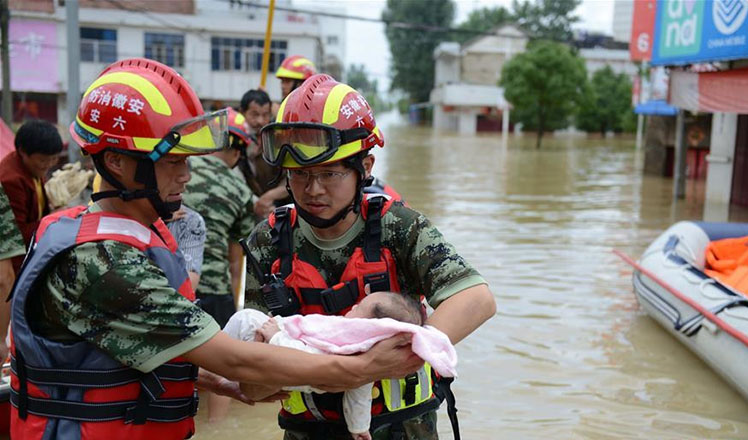The right to reject tribunal ruling is real
Updated: 2016-07-11 07:57
By Quan Xianlian(China Daily)
|
||||||||
 |
|
Missile destroyer Guangzhou launches an air-defense missile during a military exercise in the water area near south China's Hainan Island and Xisha islands, July 8, 2016. Chinese navy conducted an annual combat drill in the water area near south China's Hainan Island and Xisha islands on Friday. [Photo/Xinhua] |
After the Philippines filed a case in The Hague-based Permanent Court of Arbitration against China in the South China Sea dispute, Beijing has made it clear that it would neither participate in nor accept the ruling of the arbitral tribunal. But despite the extensive international support it has received, Beijing's "non-participation and non-acceptance" stance has been criticized by some Western countries.
There is, in fact, a precedent of "non-participation and non-acceptance" of a ruling by a third party to settle an international dispute. In the Nicaragua case of the 1980s, the then Ronald Regan-led US administration took a "non-participation and non-acceptance" stance when the International Court of Justice accepted the case; it eventually passed a ruling that went against the US.
Subsequently, although Nicaragua submitted the case twice to the United Nations Security Council for discussion, the US used its veto as a permanent Security Council member to foil its passage. Noticeably, the Security Council's members such as Britain and France and Thailand, too, refused to support Nicaragua's demand for the implementation of the ICJ ruling, by abstaining from voting on the discussion under various pretexts. By abstaining from voting, these countries indicated they, as Security Council members, chose to take into consideration extensive political factors, though they could support the ICJ verdict.
The Nicaragua case testifies that not all rulings of international courts are recognized or implemented by one or the other party. A comparison of the cases whose rulings were implemented and those whose rulings were not recognized shows the factors that would decide whether the Permanent Court of Arbitration's ruling in the Philippines' case is recognized and implemented include whether the tribunal has jurisdiction over the case and whether it passes a flawless ruling.
Manila has employed some top international lawyers to disguise the arbitration dispute with China as a case to seek separate legal status for some islands and reefs in one of China's island chains in the South China Sea to make it seem The Hague-based tribunal has jurisdiction over it. This is why the tribunal announced it does have the power to arbitrate the case. But while passing a ruling on the substantial contents of the case, the court will face a dilemma.
If it extends full support to the Philippines, its ruling will inevitably involve territorial sovereignty and thus go beyond the scope of the UN Convention on the Law of the Sea or will extend to an area in which China has announced its reservation. If true, this will push the court's ruling beyond the limits of its jurisdiction and thus challenge its legitimacy.
And an abstract ruling irrelevant to territorial sovereignty and demarcation of the waters in order to avoid the above-mentioned embarrassments will make its ruling impractical for implementation.
Either of the scenarios will automatically give China the right to not recognize and implement the ruling.
Different from the South China Sea arbitration case-in which the ruling is likely to stop short of having enough and binding content for implementation-the ICJ verdict in the Nicaragua case explicitly said the US should stop violating international law and compensate the losses it has caused to Nicaragua. So if the US, which has ignored the ICJ verdict, pressures China to implement the arbitral tribunal's ruling, it will be guilty of using double standard.
China's refusal to implement the arbitral tribunal's ruling-because it doesn't have jurisdiction over the case-will not mean it is violating international law. In fact, the great efforts China has made to resolve the South China Sea disputes with neighbors both at bilateral and regional levels reflect its commitment to using non-judicial procedures to settle them without the intervention of a third party.
Third-party arbitration is not a panacea for international disputes. And China's contribution to international peace will not be belittled because of its refusal to implement the arbitral tribunal's ruling.
The author is an associate professor of international law at the Southwest University of Political Sciences & Law, Chongqing.
- Eid al-Fitr celebrated worldwide
- Swedish PM looking at tightening laws after festival sex attacks
- British PM race cut to 3 hopefuls as 2 contenders exit contest
- Chinese herbalists offer free US treatment
- Obama praises Hillary's judgement hours after FBI's censure
- Rio mayor tells Olympic visitors: 'Don't expect New York or London'

 Griezmann scores twice to lift France into Euro final
Griezmann scores twice to lift France into Euro final
 Life goes on in flooded Wuhan
Life goes on in flooded Wuhan
 Paper cutouts offer a new view of world landmarks
Paper cutouts offer a new view of world landmarks
 Animals occupy Shanghai
Animals occupy Shanghai
 Beijing Muslims mark end of Ramadan
Beijing Muslims mark end of Ramadan
 Remember emerging heroes in China's floods
Remember emerging heroes in China's floods
 Ronaldo powers Portugal into Euro 2016 final
Ronaldo powers Portugal into Euro 2016 final
 Culture Insider: Six things you may not know about Minor Heat
Culture Insider: Six things you may not know about Minor Heat
Most Viewed
Editor's Picks

|

|

|

|

|

|
Today's Top News
Ministry slams US-Korean THAAD deployment
Two police officers shot at protest in Dallas
Abe's blame game reveals his policies failing to get results
Ending wildlife trafficking must be policy priority in Asia
Effects of supply-side reform take time to be seen
Chinese State Councilor Yang Jiechi to meet Kerry
Chinese stocks surge on back of MSCI rumors
Liang avoids jail in shooting death
US Weekly

|

|







